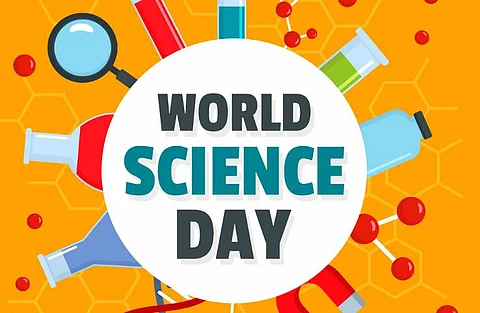
- Home
- Live Blog
- Breaking News
- Top Headlines
- Cities
- NE News
- Sentinel Media
- Sports
- Education
- Jobs

The World Science Day for Peace and Development has been celebrated on the 10th of November across the globe with the theme "Open Science, leaving no one behind", which seeks to bring scientific research and data closer to everyone living in the society.
Despite the recent progress, the world is still witnessing huge differences in various regions and countries in terms of accessing science, technology, and innovation (STI) and enjoying the fruits of their benefits.
In this regard, this year’s World Science Day aims to make scientific data, results, hypotheses, and opinions, which are the core of the scientific process, accessible to all.
According to the United Nations (UN), open science can considerably increase scientific collaboration and discovery as well as facilitate the adoption of well‐adapted technologies.
With the potential to help achieve Sustainable Development Goals, particularly in Africa, developing nations, and Small Island Developing States (SIDS), open science could bring a drastic change in society and close the current STI gaps.
Founded by United Nations Educational, Scientific, and Cultural Organization (UNESCO) in 2001, World Science Day aims to promote the wider use of science among the citizens and engage the public in debates on new scientific topics. The celebration also aims to increase public awareness of the progress made in the field of science, increase knowledge on the planet, and make societies more sustainable.
This year, UNESCO had celebrated the Day at its headquarters in Paris, France, on the 8th of November with a host of activities.
The celebration at the UNESCO headquarters includes a conversation on Open Science with school students, UNESCO Permanent Delegations, and other partner organizations.
Discussion with experts and policymakers on the benefits and challenges of “opening science to society” and “opening the society to science”, moderation of dialogue on Open Science with scientists and innovators made from Open Science were also held as part of the celebration.
The celebration also saw the award-giving ceremony of the PhosAgro/UNESCO/IUPAC grants in green chemistry for young scientists. The grants are part of the PhosAgro/UNESCO/IUPAC Partnership in Green Chemistry for Life.
Urging the people to celebrate the power of science, UNESCO tweeted, “November 10 is World #ScienceDay for Peace & Development! Let's celebrate the power of science to build peace and bolster sustainable development!”
In this regard, the UN Environment Programme also tweeted, “Tomorrow is World #ScienceDay for Peace & Development.
Open Science could lead to a sustainable future by helping to capture the experience of indigenous peoples in future assessments of #climatechange & to reflect indigenous knowledge on a global scale.”
In addition, this year’s World Science Day has been allied with the celebration of the International Year of Indigenous languages, which intends to promote the importance of local and indigenous knowledge systems and using them as tools in decision-making about fundamental aspects of everyday life.
Vital for the world’s cultural diversity, familiarity with the local and indigenous knowledge systems can act as a stepping stone for local, sustainable development.
According to International Atomic Energy (IAEA), it has been playing an important role in realizing the theme of this year’s World Science Day.
“The IAEA has been an advocate of open access to knowledge since the inception of INIS in 1970,” said DobricaSavic, Head of the Nuclear Information Section.
IAEA has made all of its documents, presentations, and records accessible to anyone via the Internet. The documents are available free of cost to everyone.
The previous editions of World Science Day, which primarily aims to link science more closely with society and keep the citizens informed about scientific developments, have witnessed lots of fruitful discussions and deliberations.
In 2017, the theme of the Day was “Science for global understanding“, which aimed at supporting UNESCO’s approach in developing scientific cooperation among different societies as well as combining global sustainability, local actions, and knowledge.
Irina Bokova, former Director-General of UNESCO, then said, “Sciences, Technology, and Innovation (STI) provides key answers to build peace and bolster sustainable development.
“We need more integrated science to strengthen water management, to ensure the sustainable use of the ocean, to protect ecosystems and biodiversity, to tackle climate change and disasters, to foster innovation.”
Last year’s theme of the World Science Day was “Science, a Human Right”, which was observed in line with the 70th anniversary of the Universal Declaration on Human Rights (article 27).
At that time, Audrey Azoulay, UNESCO Director-General, said, “UNESCO urges everyone to exercise their human right to participate in and benefit from science. This right is enshrined in the Universal Declaration of Human Rights.”
To mark World Science Day, UNESCO publishes the UNESCO Science Report every five years on the 10th of November.
Launched on the 10th of November 2015, the UNESCO Science Report: towards 2030includesmore country-level information than ever before on science, technology, and innovation (STI) governance across the world.
Led by the principle of “more research – better development”, the report was written by approximately 60 experts who covered the country or region from which they belong.
The report includes the trends and developments in science, technology, and innovation policy and governance between 2010 and mid-2015. It also provides vital information on the concerns and priorities of countries that should orient the implementation and help assess the 2030 Agenda for Sustainable Development in the future.